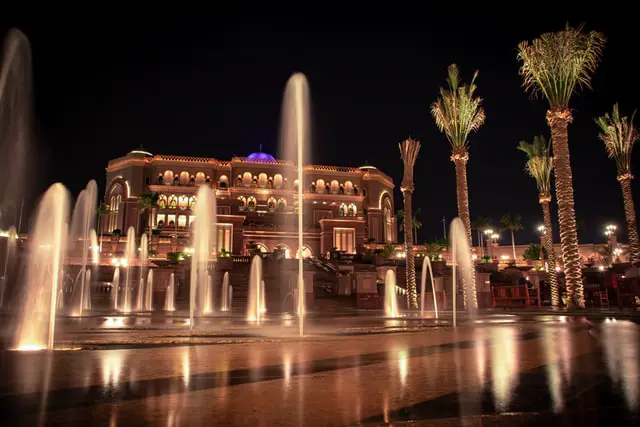
What makes a luxury hotel truly irresistible? Is it the five-star service, the lavish suites, or the sense of exclusivity that only a select few can experience? Luxury hotels cater to a unique and discerning audience—travelers who seek more than just a place to stay. They crave personalized experiences, world-class amenities, and an atmosphere of sophistication.
But who exactly is this elite clientele? Understanding the target market for luxury hotels is the key to crafting unforgettable guest experiences and driving business success. Whether you’re a hotel owner, marketer, or simply curious about the world of luxury travel, this guide will unveil the distinct groups that shape this high-end industry. Keep reading to discover who stays at luxury hotels and what truly captivates them.
Defining Luxury Hotels
Luxury hotels are more than just upscale accommodations—they offer an unparalleled level of service, comfort, and exclusivity. To understand their target market, it’s essential to first define what sets these properties apart from standard hotels.
Characteristics of Luxury Hotels
Luxury hotels are defined by a combination of premium amenities, exceptional service, and unique guest experiences. Key characteristics include:
- Impeccable Service: Highly trained staff providing personalized attention, from butlers to concierge services.
- High-End Amenities: Spa facilities, gourmet dining, private pools, and top-tier room features.
- Exclusive Locations: Prime city centers, private islands, or scenic landscapes that enhance the guest experience.
- Sophisticated Design: Elegant architecture, designer furnishings, and artistic interiors.
- Cutting-Edge Technology: Smart room controls, high-speed WiFi, and seamless digital concierge services.
These elements ensure that guests receive an experience that goes beyond basic hospitality.
Examples of Luxury Hotel Brands
Several global hotel chains and boutique properties set the gold standard for luxury travel. Notable examples include:
- The Ritz-Carlton: Known for its legendary customer service and refined elegance.
- Four Seasons: Offers a personalized experience with luxurious accommodations worldwide.
- Aman Resorts: Focuses on exclusivity, privacy, and serene environments.
- Mandarin Oriental: Blends Asian hospitality with contemporary luxury.
- St. Regis: Features opulent accommodations and signature butler services.
Each brand caters to a specific segment of the luxury market while maintaining an uncompromising commitment to quality.
The Difference Between Luxury and Standard Hotels
While standard hotels provide comfort and convenience, luxury hotels elevate the experience to an art form. Key differences include:
| Feature | Standard Hotels | Luxury Hotels |
|---|---|---|
| Service | Basic customer service | Personalized, high-touch service |
| Rooms | Functional, comfortable | Designer interiors, premium bedding |
| Dining | Casual restaurants | Michelin-starred chefs, fine dining |
| Amenities | Pool, gym | Private pools, spas, chauffeur services |
| Technology | Basic WiFi, TV | Smart room features, AI-driven services |
Luxury hotels don’t just provide a place to stay—they create an experience that keeps guests coming back. Understanding these defining features lays the foundation for identifying the right target market.
Who Is the Target Market for Luxury Hotels?
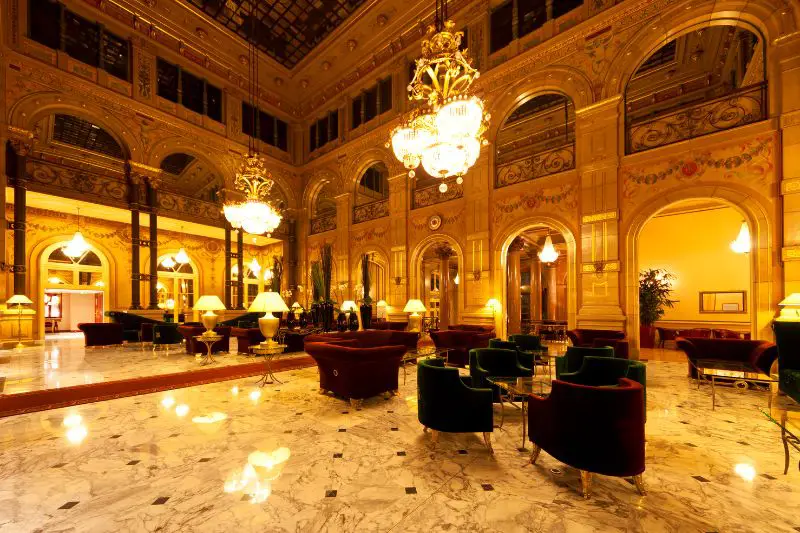
Luxury hotels cater to a diverse yet distinct group of travelers who seek exclusivity, comfort, and exceptional service. These guests are willing to invest in premium experiences, whether for business, leisure, or personal milestones. Understanding these segments can help hotel marketers tailor their offerings to attract the right clientele.
High-Net-Worth Individuals (HNWIs)
High-net-worth individuals (HNWIs) represent a key demographic for luxury hotels. These are individuals with investable assets exceeding $1 million, including business executives, celebrities, and successful entrepreneurs.
What They Look For:
- Privacy and exclusivity, often preferring boutique luxury hotels or private villas.
- Personalized concierge services, including private chefs and chauffeurs.
- Prime locations in financial districts, private islands, or elite resort destinations.
Example: The Burj Al Arab in Dubai caters to HNWIs by offering personal butler services, Rolls-Royce chauffeur options, and ultra-luxurious suites with panoramic views.
Affluent Leisure Travelers
This group includes individuals and families who travel for leisure and prioritize comfort, unique experiences, and premium amenities. They may not be ultra-wealthy but have disposable income to spend on high-end vacations.
What They Look For:
- All-inclusive luxury resorts with spa treatments and fine dining.
- Unique experiences such as yacht excursions, cultural immersion, or adventure tourism.
- High-end accommodations in prime tourist destinations like the Maldives, Santorini, or Aspen.
Example: The Four Seasons Resort in Bora Bora is a top choice for leisure travelers seeking overwater bungalows, personalized excursions, and five-star spa treatments.
Business and Corporate Travelers
Luxury hotels play a significant role in the corporate travel market. Executives, investors, and professionals attending meetings, conferences, and networking events require seamless service and top-tier accommodations.
What They Look For:
- State-of-the-art conference rooms and business centers.
- Fast, secure WiFi and technology-enabled meeting spaces.
- Convenient locations near financial hubs and airports.
Example: The Ritz-Carlton New York, Central Park, attracts business travelers with its high-end meeting facilities, dedicated business lounges, and easy access to corporate districts.
Honeymooners and Couples
Romantic travelers seeking an unforgettable getaway often choose luxury hotels that offer exclusivity and intimate experiences. This segment drives demand for honeymoon suites, couples’ retreats, and anniversary packages.
What They Look For:
- Private beachfront villas or overwater bungalows.
- Customized romantic experiences such as candlelit dinners and couples’ spa treatments.
- Stunning natural surroundings and breathtaking views.
Example: The One&Only Reethi Rah in the Maldives offers secluded villas, personalized butler service, and exclusive dining experiences designed for couples.
Luxury Experience Seekers (Millennials & Gen Z)
Younger generations are redefining luxury travel. Instead of just high-end accommodations, they prioritize unique, immersive experiences and digital convenience. This market segment is growing as more millennials and Gen Z travelers reach higher income levels.
What They Look For:
- Boutique luxury hotels with locally inspired designs and personalized service.
- Eco-friendly and sustainable luxury accommodations.
- Seamless digital experiences, from mobile check-ins to AI-powered concierge services.
Example: The Aman Tokyo attracts younger luxury travelers with its minimalist aesthetic, wellness-focused amenities, and tech-savvy guest experiences.
Group and Family Travelers
Affluent families and luxury group travelers look for spacious accommodations and premium services that cater to multiple guests. These travelers often seek child-friendly luxury hotels or exclusive buyouts for family reunions and special celebrations.
What They Look For:
- Large private villas with dedicated staff.
- Family-friendly amenities such as kids’ clubs and private excursions.
- Exclusive packages for milestone celebrations like birthdays and anniversaries.
Example: The Atlantis The Palm in Dubai offers an underwater suite, waterpark access, and kid-friendly luxury experiences, making it a top choice for wealthy families.
Key Factors Influencing the Luxury Hotel Market
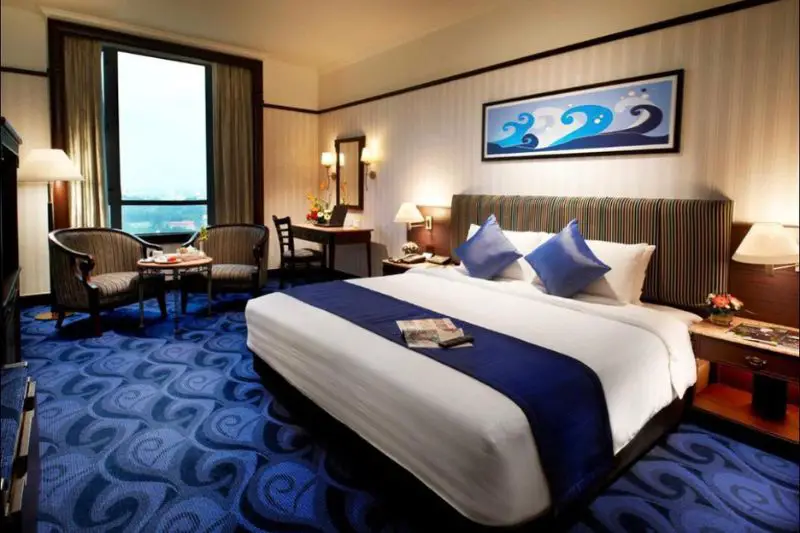
The luxury hotel industry is shaped by several critical factors that determine guest expectations, market trends, and competitive positioning. Understanding these influences helps hotel owners and marketers refine their offerings to attract high-value guests.
Evolving Consumer Expectations
Luxury travelers today demand more than just opulent surroundings. Their preferences have shifted toward personalized experiences, sustainability, and seamless technology integration.
What’s Changing:
- Increased demand for hyper-personalized services, from curated itineraries to customized room amenities.
- Growing interest in sustainable luxury, with eco-friendly hotels, ethical sourcing, and carbon-neutral stays gaining traction.
- Preference for experiential travel, where cultural immersion, adventure, and wellness play a central role.
Example: Six Senses Resorts integrates sustainability with luxury by offering organic farm-to-table dining, renewable energy sources, and wellness retreats.
Economic Trends and Market Demand
Global economic conditions significantly impact the luxury hospitality sector. While high-net-worth individuals remain resilient to economic downturns, shifts in disposable income and travel spending patterns affect other market segments.
Key Influences:
- Fluctuations in global wealth distribution and high-income demographics.
- The rise of “affordable luxury” options catering to aspirational travelers.
- Post-pandemic travel rebounds leading to increased demand for exclusive and private experiences.
Example: Private island resorts, such as those in the Seychelles or the Maldives, saw a surge in demand post-pandemic as affluent travelers sought secluded getaways.
The Role of Digital Transformation
Technology plays a pivotal role in enhancing luxury hotel experiences. Digital innovations are not only improving operational efficiency but also redefining guest interactions.
Notable Trends:
- AI-driven concierge services providing instant recommendations and assistance.
- Seamless mobile experiences, including app-based check-ins and smart room controls.
- Augmented reality (AR) and virtual reality (VR) used for virtual property tours before booking.
Example: The Peninsula Hotels launched a mobile app that allows guests to personalize their stay, book experiences, and interact with hotel staff through a digital concierge.
The Influence of Sustainability and Ethical Travel
Sustainability is no longer a niche concern—it’s a key differentiator in the luxury hospitality industry. Eco-conscious travelers actively seek out hotels that align with their values.
Sustainable Practices in Luxury Hotels:
- Implementation of zero-waste initiatives and plastic-free policies.
- Use of locally sourced, organic materials in construction and interior design.
- Investment in community-driven tourism and cultural preservation efforts.
Example: The Brando, a luxury resort in French Polynesia, runs entirely on renewable energy and uses seawater air conditioning to reduce its carbon footprint.
Global Travel and Destination Trends
The rise of emerging luxury destinations and shifting travel behaviors influence where high-end travelers choose to stay. While classic locations like Paris, New York, and Dubai remain popular, new trends are shaping the market.
Key Shifts:
- A surge in demand for off-the-grid luxury, such as Arctic retreats and remote jungle lodges.
- Growing popularity of wellness tourism, with hotels offering meditation retreats and holistic health programs.
- Increasing preference for longer stays and “workcations”, as remote work enables extended travel.
Example: The Fogo Island Inn in Canada attracts luxury travelers seeking remote, nature-focused experiences while supporting local communities.
Effective Marketing Strategies for Luxury Hotels
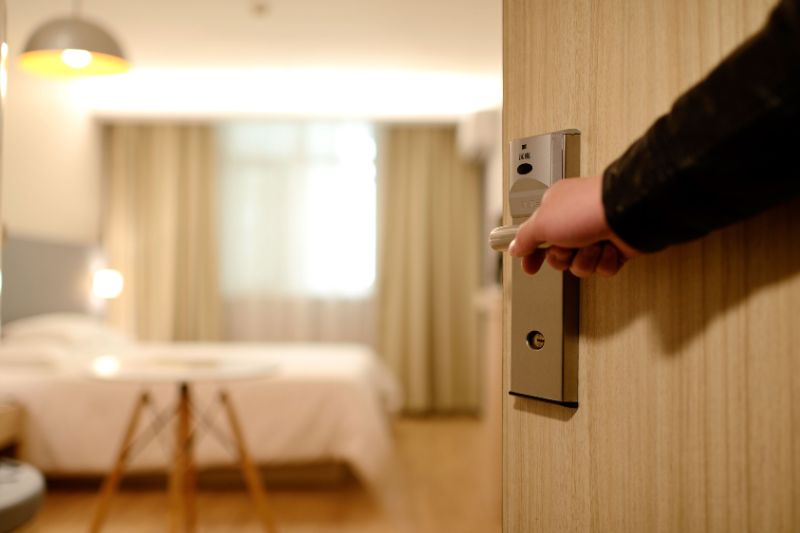
To attract and retain high-value guests, luxury hotels must implement marketing strategies that align with their target audience’s expectations. A well-crafted approach combines personalized experiences, digital innovation, and strategic brand positioning.
Crafting a Compelling Brand Story
Luxury travelers seek more than just accommodation—they invest in an experience. A strong brand story differentiates a hotel from competitors and creates an emotional connection with potential guests.
Essential Elements of a Luxury Brand Narrative:
- A clear brand identity that highlights exclusivity, heritage, or innovation.
- A compelling backstory—whether it’s a historic property, a unique design concept, or an eco-conscious mission.
- Authenticity that resonates with high-net-worth travelers seeking meaningful experiences.
Example: Aman Resorts has built a reputation around serenity, privacy, and cultural immersion, making its properties highly sought after by discerning travelers.
Leveraging Digital Marketing and Personalization
A sophisticated digital presence is crucial for engaging luxury travelers. Personalized marketing enhances guest experiences and builds brand loyalty.
Key Digital Strategies:
- AI-driven marketing that tailors promotions based on past guest behavior.
- Personalized email campaigns offering exclusive deals and curated recommendations.
- Luxury content marketing, including high-quality videos, immersive photography, and editorial storytelling.
Example: The Ritz-Carlton’s digital marketing strategy includes a dedicated content hub that shares destination insights, luxury travel trends, and behind-the-scenes experiences.
Social Media and Influencer Collaborations
Social media plays a significant role in shaping travel decisions, particularly among affluent millennials and Gen Z travelers. Strategic collaborations amplify brand reach and credibility.
Best Practices:
- Partnering with luxury travel influencers who align with the brand’s image.
- Showcasing user-generated content from satisfied guests to build social proof.
- Utilizing platform-specific strategies, such as Instagram reels, LinkedIn thought leadership, and TikTok storytelling.
Example: The Burj Al Arab in Dubai effectively uses social media by featuring celebrity stays, behind-the-scenes luxury experiences, and immersive virtual tours.
Exclusive Loyalty Programs and VIP Perks
High-end travelers value exclusivity and recognition. A well-designed loyalty program enhances guest retention and encourages repeat bookings.
Effective Loyalty Strategies:
- Offering elite status tiers with personalized concierge services.
- Providing members-only benefits, such as room upgrades, bespoke experiences, and private event invitations.
- Implementing data-driven rewards, allowing guests to redeem points for customized experiences rather than standard discounts.
Example: Four Seasons’ Preferred Partner Program gives VIP guests complimentary breakfast, room upgrades, and resort credits, enhancing their overall experience.
High-Touch Customer Service as a Marketing Tool
Exceptional service is a powerful marketing asset. Luxury guests expect seamless, anticipatory service that exceeds their expectations.
Key Service Strategies:
- Hyper-personalization, from greeting guests by name to remembering their preferences across visits.
- 24/7 concierge availability, ensuring seamless assistance with dining, transportation, and activities.
- Integrated technology, such as AI chatbots and smart room controls, to enhance convenience without compromising exclusivity.
Example: The St. Regis Butler Service sets the brand apart by providing personalized assistance, from unpacking luggage to arranging unique local experiences.
Emerging Trends in Luxury Hospitality
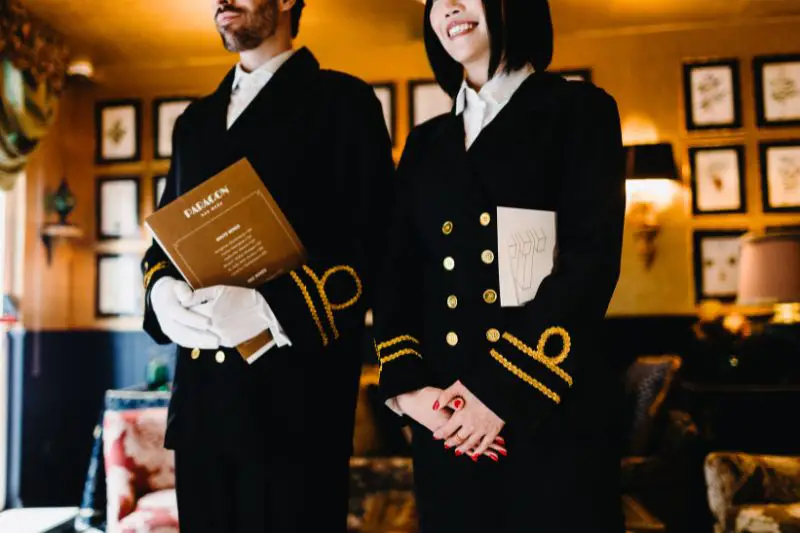
The luxury hotel industry is constantly evolving to meet the expectations of discerning travelers. From cutting-edge technology to sustainable practices, staying ahead of these trends is crucial for maintaining a competitive edge.
Sustainable and Eco-Luxury Initiatives
Sustainability has become a priority for affluent travelers who seek responsible luxury experiences. Hotels that integrate eco-conscious practices without compromising comfort or exclusivity gain a significant advantage.
Key Sustainable Practices:
- Carbon-neutral operations, including renewable energy sources and waste reduction programs.
- Sustainable architecture and design, such as LEED-certified buildings and locally sourced materials.
- Eco-friendly guest experiences, such as organic spa treatments and farm-to-table dining options.
Example: Six Senses Hotels, known for their commitment to sustainability, integrate local culture and eco-friendly innovations while maintaining ultra-luxurious accommodations.
Hyper-Personalization and AI Integration
Luxury travelers expect highly tailored experiences. Advances in artificial intelligence and data analytics allow hotels to anticipate and fulfill guest needs with precision.
How Hotels Are Personalizing Experiences:
- AI-powered recommendations for dining, excursions, and wellness programs.
- Smart room technology, allowing guests to customize lighting, temperature, and entertainment.
- Behavior-based marketing, offering personalized promotions based on guest preferences and past stays.
Example: The Wynn Las Vegas utilizes AI-powered voice assistants in rooms, enabling guests to control their environment effortlessly.
Experiential and Transformational Travel
Affluent guests are increasingly seeking meaningful and immersive experiences rather than traditional luxury. Hotels that offer exclusive, tailor-made activities can attract this growing segment.
Types of Experiential Offerings:
- Cultural immersion, such as private art tours, heritage site access, or cooking classes with renowned chefs.
- Adventure and wellness retreats, featuring guided expeditions, personalized fitness programs, or holistic healing therapies.
- VIP behind-the-scenes access, including private fashion show viewings or one-on-one sessions with industry experts.
Example: Aman’s bespoke experiences, such as helicopter safaris in Bhutan and private island retreats, redefine luxury travel by emphasizing exclusivity and authenticity.
The Rise of Ultra-Private and Exclusive Stays
Privacy is a top priority for high-net-worth individuals, leading to a rise in ultra-exclusive accommodations. Hotels that offer discreet, secluded experiences cater to this demand.
Ways Hotels Are Enhancing Privacy:
- Standalone luxury villas with private pools, dining areas, and personalized staff.
- Buyout options, allowing guests to reserve entire properties for events or retreats.
- VIP airport services, including private jet charters and fast-track immigration.
Example: The Brando in French Polynesia offers an all-inclusive, private island experience with a focus on sustainability and seclusion, attracting celebrities and world leaders.
Digital Nomad and Extended-Stay Luxury
With the rise of remote work, affluent travelers are seeking high-end accommodations that blend business and leisure. Luxury hotels are adapting by offering extended-stay packages with premium workspaces.
Features Catering to Luxury Digital Nomads:
- Private co-working spaces with high-speed internet and concierge support.
- Long-stay incentives, such as reduced rates, personalized amenities, and flexible services.
- Curated work-life balance experiences, including wellness programs and cultural excursions.
Example: The Four Seasons Private Retreats program provides long-term luxury stays with customized services, attracting executives and entrepreneurs who blend work and leisure seamlessly.
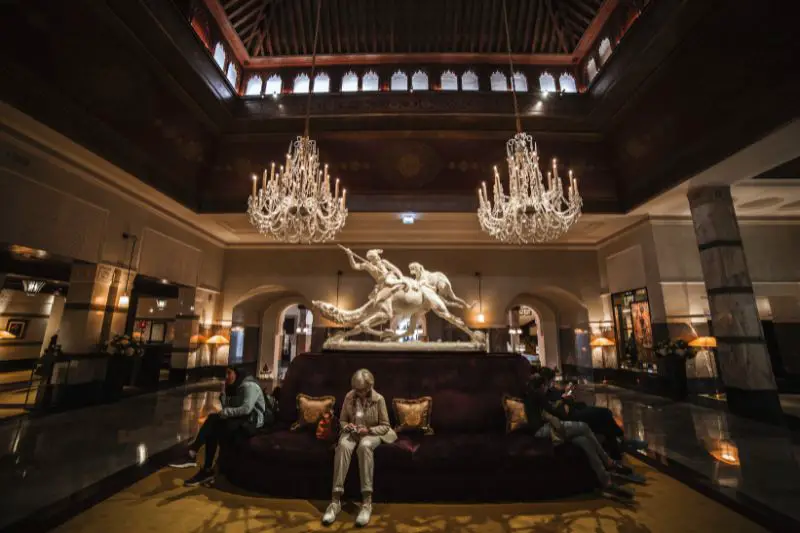
Conclusion
Understanding the target market for luxury hotels requires a deep awareness of evolving traveler expectations and industry trends. High-net-worth individuals, business executives, celebrities, and experiential travelers all seek exclusivity, personalized service, and unique, high-end experiences. To attract and retain these affluent guests, luxury hotels must focus on customization, sustainability, and innovation.
By embracing emerging trends such as hyper-personalization, eco-conscious luxury, and ultra-private stays, hotels can differentiate themselves in a competitive market. The future of luxury hospitality lies in crafting exceptional, tailor-made experiences that go beyond opulence—creating lasting emotional connections with guests.
For luxury hoteliers, the key to success is not just providing five-star accommodations but anticipating and exceeding the desires of discerning travelers. By continuously evolving and elevating guest experiences, luxury hotels can solidify their position as industry leaders and cultivate long-term brand loyalty.
